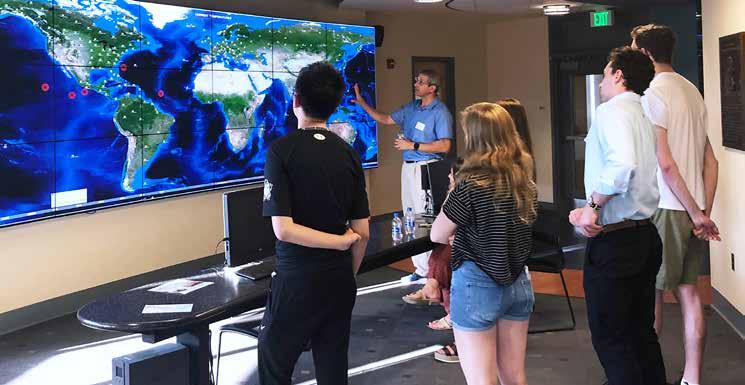
4 minute read
Semester abroad shows Scholar importance of conservation
Programs allow Scholars to engage with faculty in different ways
Penn State teaching professor in meteorology Jon Nese gets all kinds of questions about the weather, most of them relating to accuracy of forecasts.
Advertisement
When the questions come from Schreyer Scholars, though, Nese says they are typically more nuanced and curious — not as much about the forecasts themselves but about the science that goes into making those forecasts.
“It’s truly inquisitive,” Nese said. “They really want to know.”
That was one of the reasons Nese enlisted in the Distinguished Honors Faculty Program, which pairs select faculty from across the University’s 12 academic colleges with small groups of Scholars for localized field trips, discussions, or both, relating to a breadth of topics.
“It’s connecting them to faculty in a different context,” said Schreyer Honors College Associate Dean Keefe Manning. “They can see the other side of faculty, that faculty are human and have other interests. When you engage and show interest in what the faculty are sharing with you, you get a lot more depth about what they are sharing, and they will react to students in a different way.”
During the 2019-20 academic year, Scholars visited the National Comedy Museum with assistant professor of film and media studies Pearl Gluck, conducted a large-scale shake table test to simulate an earthquake with associate professor of civil engineering Ming Xiao, and accompanied Nese to the Joel N. Myers Weather Center in the Walker Building, where they learned about the equipment meteorologists use to formulate forecasts and recorded themselves in front of a green screen.
In the spring, Nese was one of several faculty members who opted to hold programs via Zoom for students, bringing in former colleague David Titley, a retired meterology professor and former Rear Admiral in the United States Navy, for a discussion about climate change.
“The faculty really respond to being selected and see this as a huge opportunity for them to expand their horizons as well,” Manning said.
The College encourages first-year students to register for the programs as both a way for them to get early exposure to honors faculty and to subjects they might be interested in but had not considered. Distinguished Honors Faculty Programs are also unique opportunities for Scholars already established in their majors to expand their knowledge on topics unrelated to their normal area of study.
Nese likes the small-group feel of the sessions, which usually include between 10-20 Scholars and often incorporate a lunch or dinner, and the chance to interact with students eager to expand their breadth of knowledge.
“Walking our campus are lots of future leaders,” Nese said, “but when you get the Scholars, the probability of these students going on and becoming leaders in their field is a notch above.”
Data analyst brings new perspective to College
Chi Nguyen is a storyteller at heart and an accomplished writer. Telling stories with data just happens to be her day job.
“A lot of times, people think that a data analyst is just a person who crunches numbers,” she said. “But to me, it’s more like the person who tells the story behind the numbers.”
Nguyen recently concluded her first year as the Schreyer Honors College’s data analyst. She has streamlined the College’s data-gathering processes and used data to help inform the staff about trends in the student population, such as a retention study to identify the reasons Scholars withdraw from the College. She also contributed to the College’s two-year assessment plan (see story on Page 8).
“This is a place where people welcome change and are willing to look into what they’re doing, what works and what doesn’t work,” she said.
It was an eventful year in other aspects of Nguyen’s life as well. She completed her doctorate studies in educational leadership and comparative and international education and became a naturalized U.S. citizen during the summer.
“It makes me very humble when I think about becoming an immigrant here and the meaning of it,” she said.
Nguyen grew up in Hanoi, Vietnam, in a family steeped in writing and research. Her grandparents and mother were journalists and her father a dictionary editor. She has a popular blog about personal development and has published two editions of “A Book about Minimalism” in Vietnamese.
She was an international studies major at Hanoi University with aspirations of becoming a diplomat the first time she came to the United States, at age 19, as part of an AsiaPacific Economic Cooperation conference. The second part of that conference was held in Lima, Peru, where Nguyen interviewed politicians during the day but, exploring the city by night, was disturbed by the poverty she witnessed only a few miles away.
That was a turning point for Nguyen, whose interest began to shift away from diplomacy and toward social justice and educational equity. She earned a master’s degree in education, culture and society at the University of Pennsylvania, and then began work toward her doctorate at Penn State.

“The more I spend my time doing research in education, the more I realize there are a lot of systematic issues in education that actually perpetuate injustice and inequality,” she said.
Some of the solutions to those issues can be better understood and implemented, Nguyen believes, by exploring the data. The numbers help her tell a story, whether that is publishing her research in academic journals or assessing student outcomes in the Honors College.
“In order to do my job well, I need to understand the context,” she said.










